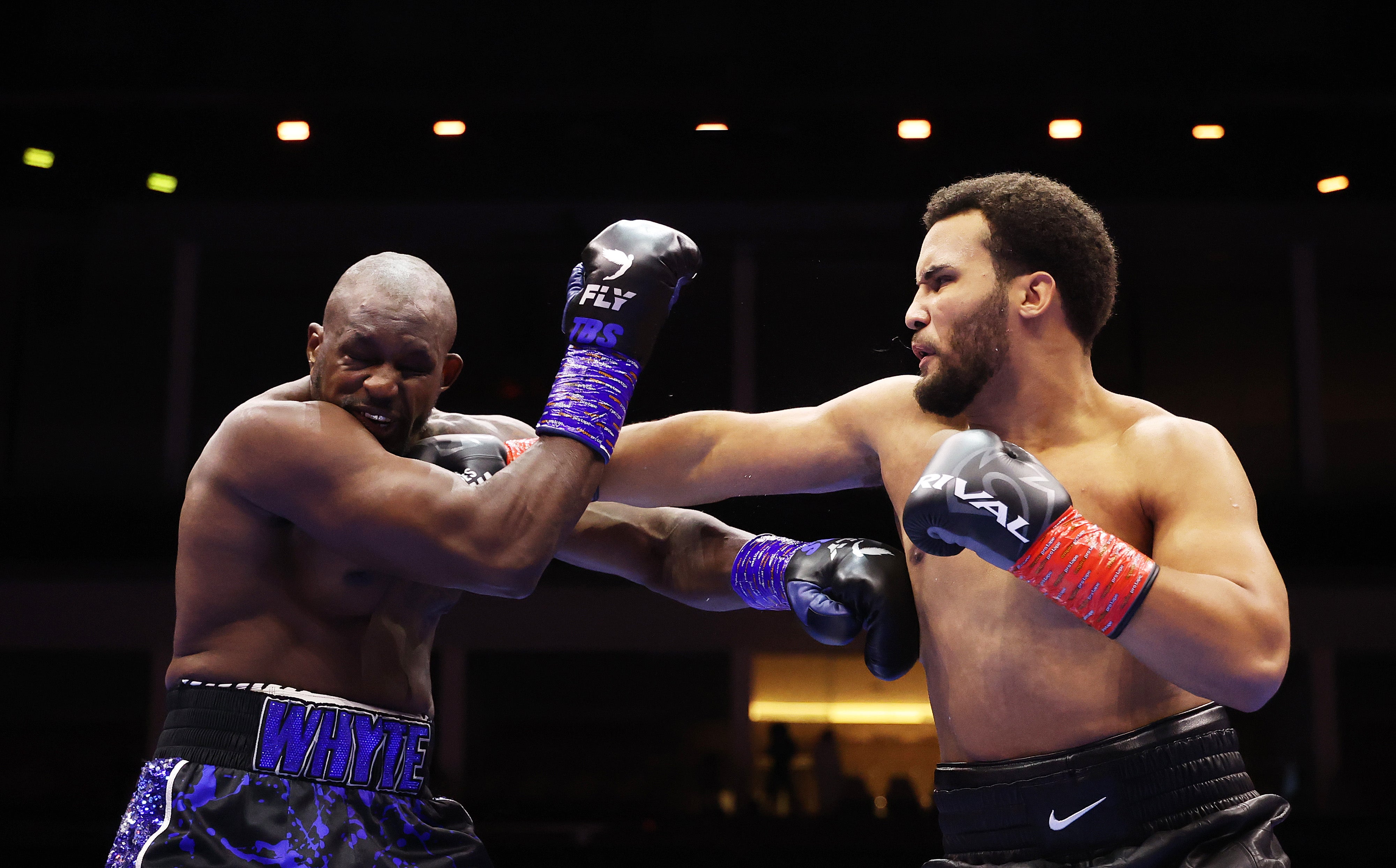You probably wouldn’t want to be hit by a heavyweight boxer. This might seem obvious, but it is interesting to think about the reason why.
These athletes have acquired the ability to deliver knockout blows in the blink of an eye, but is it because they are supremely strong, powerful or skillful? Chances are it is a blend of all three, with each attribute working in tandem to support the other.
This would suggest that you need a certain level of strength to compete at the top-level of boxing. But just how strong would you have to be to take a shot at a championship belt?
How strong are boxers?
Anthony Joshua could reportedly squat 200kg at the peak of his powerlifting powers. Moses Itauma, seen by many as the future of heavyweight boxing, went one better with a 211kg squat, 175kg bench press and 280kg deadlift.
Johnny Fisher’s strength and conditioning coach Sonny Cannon recently shared a video of his athlete repping out box squats at 210kg. And even dropping down a few weight divisions, Conor Benn’s performance coach Dan Lawrence revealed the fighter would hit 180kg quarter squats.
Read more: The two exercises that give Moses Itauma ‘the edge’ over most opponents

Does strength matter in boxing?
From the numbers above, it’s fair to draw the conclusion that professional boxers are strong – very strong. If you pitted two fighters against each other who were identical in all ways other than their strength levels, the smart money would be on the stronger athlete, suggesting that strength does play a role in sporting performance too.
However, there are athletes that perform better in tests of absolute strength but worse in the ring. Strongmen Eddie Hall and Hafthor Bjornsson have registered squat PBs of 405kg and 460kg respectively. Both have also taken part in exhibition boxing matches, but the fact they are not considered on par with the top professional heavyweights tells us that strength is not the be-all and end-all in the sport.
Read more: I tried Daniel Dubois’ sprint routine – and it’s not for the fainthearted

How strong does a boxer need to be?
The simple answer to this question is: strong enough. You need to be strong enough to perform in the ring and withstand the considerable rigours of the sport. However, spending too much training time honing strength is likely to see other important attributes for the sport – such as power, skill and agility – suffer as a result.
Dan Lawrence, Matchroom boxing’s head of performance and part of the team currently preparing Conor Benn for his rematch with Chris Eubank Jr, says he prioritises “general physical qualities” first when working with fighters.
“When I say general qualities: Do we want to become stronger? Yes. Do we want to become more powerful? Yes. Do we want to improve VO2 max? Yes, of course we do. All of these are going to help,” he told me during the pre-fight camp for Benn’s first clash with Eubank Jr. But all qualities must be balanced, rather than developed in isolation.
With the establishing of these physical qualities, Lawrence then weaves in more specificity to his athletes’ training as fight night draws nearer.
Another enjoyable analogy relating to the training of professional athletes comes from esteemed coaches Dan John and Pavel Tsatsouline, in their book Easy Strength.
“The people I listen to in sport training… have figured out that you need to work on your sport,” John writes. “Then go in the weight room and get stronger. Rinse. Lather. Repeat.
“This is the classic concept of yin-yang. As you get stronger on one side of the model, your technical base should improve too. As you glide up technically, you should also be increasing your weight room lifts. Yes, there are those two small dots, where one can go into the gym and do a technical ‘shadow’ move with weights or onto the field of play and do an overload – it may or may not help.”
Interestingly, in a 2020 interview with Men’s Health, Anthony Joshua said he had “moved away from just relying on strength” and placed more emphasis on technique. This does not mean lifting weights was ditched entirely, but rather the athlete’s camp had readdressed the balance of his training – and for good reason.
In Lawrence’s words, “a boxer is a supreme athlete because they work across so many different disciplines from a physiological point of view”.
A fighter must be strong, fast, agile, powerful, mobile and more just to earn the right to face a professional opponent in the ring. To brew this recipe for success, all contributing attributes need nurturing, with little room to favour one above the others – absolute strength or otherwise.
So how strong does a boxer need to be? Strong enough to hold their own with the competition, but not so strong that this attribute is trained at the expense of other important physical qualities.
Read more: Oleksandr Usyk swears by this training method – this is why more boxers should be following his lead

Is strength training good for boxers?
From the evidence above, we can see that strength, and the training that underpins it, is just one piece of the puzzle for a professional boxer – but a puzzle does not look very good with a piece missing.
So, while it does not hold the same weight as time spent sparring and in the ring, I believe strength training remains an important part of a boxer’s fight preparations. Play with the weights and way you are lifting them, and it can develop several attributes along the force-velocity curve too, including absolute strength, speed and power.
One widely-held belief that has impacted the adoption of certain strength training techniques in boxing is the idea that lifting heavy weights will slow fighters down. This is an opinion Moses Itauma’s strength and conditioning coach Jordan Vine is keen to dispel.
“With boxing, it’s still in the dark ages where people are like, ‘Don’t lift heavy weights, it will slow you down’,” he tells me. “But if you know how to do it, and when to do it, it can add to your boxing.”
Judging by Itauma’s recent performances, I am inclined to agree with him.
“Compound lifts are seen as the wrong thing to do in boxing, especially with squats,” Vine adds. “But I think building a strong base is really important. I don’t know anyone in life or sport that wouldn’t want to be stronger, and I certainly don’t know anyone that would want to be weaker.”
Read more: Top strength and conditioning coach reveals the three exercises no boxer should be without
DAZN is the home of combat sports, broadcasting over 185 fights a year from the world’s best promoters, including Matchroom, Queensberry, Golden Boy, Misfits, PFL, BKFC, GLORY and more. An Annual Saver subscription is a one-off cost of £119.99 / $224.99 (for 12 months access), that’s just 64p / $1.21 per fight.
There is also a Monthly Flex Pass option (cancel any time) at £24.99 / $29.99 per month. A subscription includes weekly magazine shows, comprehensive fight library, exclusive interviews, behind-the-scenes documentaries, and podcasts and vodcasts.
For pricing in your country, more information and to sign up, click here.



